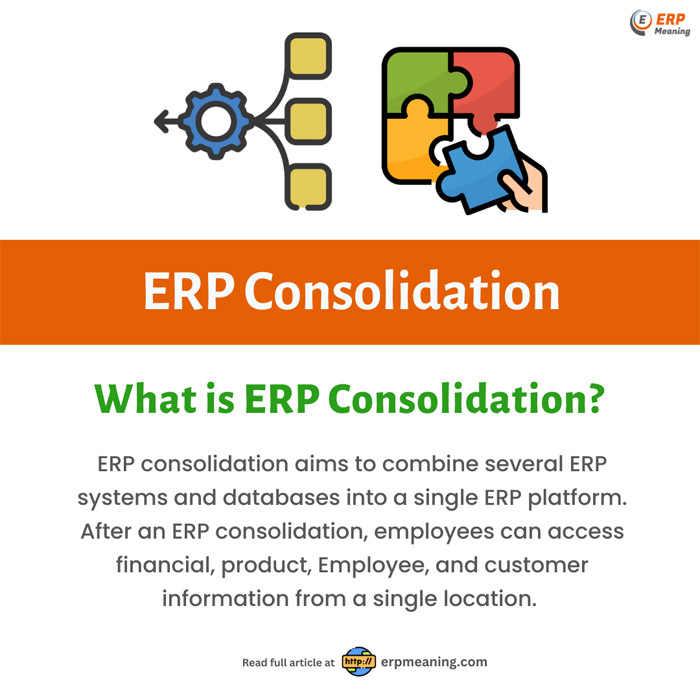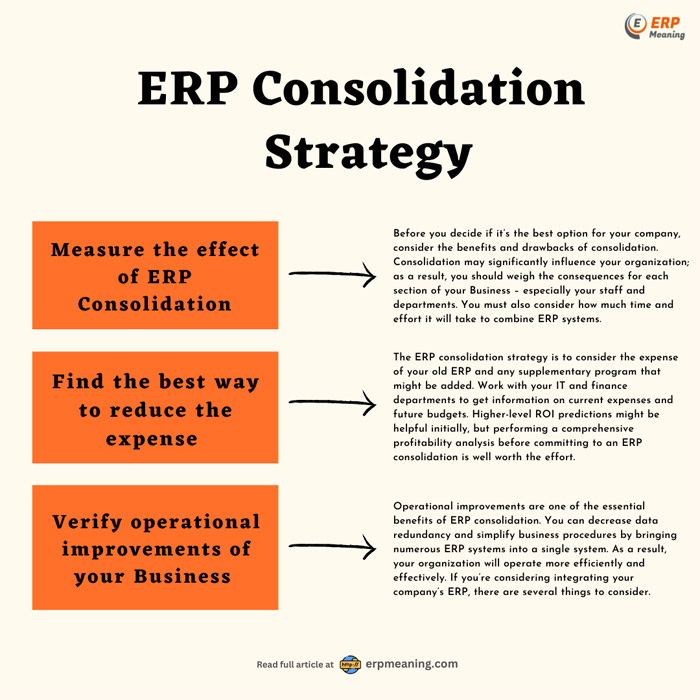Businesses require new software systems to assist with various operation elements as they expand. For example, a company may build an inventory management system, specialized software for accounts payable and receivable processing, or customer relationship management. A single enterprise resource planning system can often handle all of these functions.

However, sometimes businesses have multiple ERP systems because of mergers, acquisitions, or new business units. Consolidating a single ERP system can be expensive and difficult, but it can save you a lot of time and money in the long run. You need to know everything when deciding if ERP consolidation is right for your Business. In this blog, we will go thru the best ERP consolidation strategy for a better ERP merge.
Meaning of ERP Consolidation
An ERP consolidation aims to combine several ERP systems and databases into a single ERP platform. After an ERP consolidation, employees can access financial, product, Employee, and customer information from a single location.
A company may choose one of its existing ERP systems to consolidate. However, before deciding to continue using the current software, an ERP consolidation project is an excellent opportunity to evaluate different alternatives to see if there’s a better fit for the Business’s long-term goals. ERP Consolidation Strategy is the best way to reduce expenses and improve your Business’s operational improvements.
If a firm has several ERP systems, it must pay each vendor to maintain them. This might lead to incorrect information and delays in communication between departments that utilize varied software. A single ERP system eliminates the need for numerous sets of data, saving time and money.
You may keep track of and manage all data for services or products in one system if you have a single ERP system. Customer, vendor, and employee information, agreements, communication history, and payment preferences are among the many details you’ll be able to access. Consolidating numerous ERP systems might even assist you to discover new areas of your Business to develop.

ERP Consolidation Strategy
Here are a few ERP Consolidation Strategy we should consider for a successful ERP merge
1. Measure the effect of ERP Consolidation
Before you decide if it’s the best option for your company, consider the benefits and drawbacks of consolidation. Consolidation may significantly influence your organization; as a result, you should weigh the consequences for each section of your Business – especially your staff and departments. You must also consider how much time and effort it will take to combine ERP systems.
2. Find the best way to reduce the expense
The ERP consolidation strategy is to consider the expense of your old ERP and any supplementary program that might be added. Work with your IT and finance departments to get information on current expenses and future budgets. Higher-level ROI predictions might be helpful initially, but performing a comprehensive profitability analysis before committing to an ERP consolidation is well worth the effort.
3. Verify operational improvements of your Business
Operational improvements are one of the essential benefits of ERP consolidation. You can decrease data redundancy and simplify business procedures by bringing numerous ERP systems into a single system. As a result, your organization will operate more efficiently and effectively.
If you’re considering integrating your company’s ERP, there are several things to consider. You may evaluate the inefficiencies and expenses of your present system by looking at case studies from ERP providers, white papers, and employee surveys.
ERP Consolidation Best Practices
Businesses should rely on tried-and-true ERP implementation methods when combining their business systems. Here are some strategies for reducing the stress of integrating all functions onto one platform:
Clean and Standardize Your Data
The process begins in your existing system. Consider getting rid of outdated data that isn’t needed to be moved to the new system. Then, go through each current system to ensure you’re utilizing consistent formatting and data types that can be combined into a single dataset.
Create a Plan
Preparing your old system, setting up your new ERP, migrating data, testing, and training the workforce will take some time. Make sure you allow for buffer times between tasks. Celebrate when the project is done with a happy hour or another event.
Set a Date
Setting a date to complete the transition is as simple as selecting a day on your calendar. Many firms will continue operating several systems simultaneously if something goes wrong at the start.
Get the support of stakeholders and end users
High-level executives usually initiate ERP implementations. However, the ERP will affect every employee in your company. As a result, it is essential to gain the support of all stakeholders.
Update Processes with New Functions
Many of the upgrades to your new ERP system will benefit end-users. New processes should result in improved efficiency. For both sides, this is a win-win situation since workers will be able to accomplish their tasks more efficiently. Educating each user category about any changes and how things work in the upgraded system is important.
Advantages of ERP Consolidation
There are plenty of advantages that your business will enjoy by consolidating its ERP systems. Here are some of the key benefits:
- Improved process efficiency: When you combine multiple ERP systems into one, you can decrease data redundancy and simplify business procedures. As a result, your organization will operate more efficiently and effectively.
- Increased ROI: One of the main reasons businesses opt for ERP consolidation is to increase their return on investment (ROI). By reducing the number of software programs being used, companies can save money on licensing fees and maintenance costs.
- Greater visibility into operations: With a consolidated ERP system in place, businesses will have greater visibility into their operations. This improved visibility can help identify areas where processes can be streamlined or improved.
- Improved customer service: When your Business has a consolidated ERP system, it will be better equipped to handle customer inquiries and requests.
- Reduced risks: When you consolidate your ERP systems, you also reduce the risks associated with using multiple software programs. Having a single point of failure is much less risky than relying on multiple software programs. In addition, by consolidating your ERP systems, you can take advantage of features that may not have been available in your previous system.
The key aspect of ERP Consolidation Strategy
It’s not unusual for businesses to have numerous ERP systems, many of which are from different providers. Many firms seek SaaS-based ERP solutions on their own after mergers and acquisitions because disparate IT platforms and branches require individualized software development.
Consolidation of ERP is the process of selecting one or two systems instead than many. It also entails comprehending how the new system will aid you in achieving your company objectives. If it’s not beneficial to you, don’t do it. Here are four key aspects of an ERP consolidation strategy:
- Business processes: Review your company’s procedures and how they will be incorporated into the new system. Ensure the chosen system can handle your current and future demands. The calculation of benefits from improving business functions goes into the consolidation business case, as well as other projected advantages.
- User perspective: From the user’s perspective, ERP consolidation can be a positive or negative experience. Users may have to relearn how to perform specific tasks in the new system. As such, providing training and support is important to ensure a smooth transition.
- Technology: When consolidating your ERP systems, you’ll need to consider the technology involved. Ensure the chosen system is compatible with your existing infrastructure and can scale as your needs grow.
- Costs: One of the main considerations in any ERP consolidation strategy is the cost. Consider all costs, including licensing, implementation, and training. In addition, don’t forget to factor in the cost of downtime during the transition.
Why ERP Consolidation is important for your Business?
Most organizations using ERP solutions, especially those in the professional services industry, have many moving pieces that must be kept track of and reported on to keep employees updated on company and customer activities.
You wouldn’t make people fill out several forms to gather the same information during a marketing campaign, so you’d use a single form to funnel all relevant data to one place for easy monitoring and analysis. Your company’s ERP consolidation works in the same way. Instead of keeping comparable information in numerous locations, it should be recorded into a single authoritative source of truth.
There are several benefits to performing ERP consolidation, including the following:
Smarter Business Decisions
It’s time for your company to evaluate its current ERP systems and choose one for consolidation or a new ERP solution. By performing a system consolidation audit, you can determine exactly what your ERP business requirements are.
Growth Opportunities
As your business grows, it will likely experience new demands that its current ERP system can’t handle. An ERP consolidation can allow you to re-evaluate your business processes and choose a system that can accommodate future growth.
Most businesses will require time, effort, and money to implement an ERP consolidation initiative. However, the return on investment of gaining business-wide visibility and ultimately enhancing the customer experience are sure to pay off.
How Do I know whether I need ERP Consolidation or not
When you have complete control of the tools and solutions that drive your company’s operations, you also control the customer experience. You enable employees in sales, service, finance, recruiting, and other crucial departments to fully comprehend the project lifecycle and how their work affects the client experience.
We believe that ERP consolidation will benefit you no matter what business you are in. However, you must first conduct a thorough analysis to determine whether consolidation will make your company stronger than it was before.
There are a few brief guidelines to assist you to decide whether or not an ERP consolidation is the proper course of action for your firm:
Analyze financial department
Make a list of everything you’ll have to learn, do, and buy if you choose to migrate. Make sure you know how much it will cost to switch your operation. These figures include licensing fees, security concerns, utility expenses, hosting costs, tech support charges, employee training expenditures, and other operational expenses that may occur throughout the onboarding process. While ERP consolidation has a payback period, doing the up-front calculations is still crucial.
Check the capability of Employee
If your company has a large number of non-amenable employees, the ERP consolidation process might be more difficult or even come to a halt. If there’s resistance inside your organization to change, an ERP consolidation won’t work.
Analyze the company for better decisions
Everyone in your Business works differently and has different demands. Consolidating your ERP systems is problematic because you don’t know what solution should replace your current procedures. To properly evaluate your ERP option, invest time studying vendor reviews and case studies. Consider how much research you’ve done on your potential solution against your existing operational costs, employee issues, and inefficiencies.
Conclusion
ERP consolidation is the process of integrating multiple ERP systems into one. The goal is to have a single source of truth for your business data and processes. There are several benefits to ERP consolidation, including smarter business decisions, growth opportunities, and enhanced customer experiences. To determine if ERP consolidation is right for your company, analyze your financial department, check the capability of your employees, and study your company’s needs.
